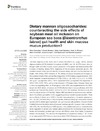Please use this identifier to cite or link to this item:
https://accedacris.ulpgc.es/jspui/handle/10553/53478
| Title: | Dietary mannan oligosaccharides: counteracting the side effects of soybean meal oil inclusion on european sea bass (Dicentrarchus labrax) gut health and skin mucosa mucus production? | Authors: | Torrecillas Burriel,Silvia Montero, Daniel Jose Caballero, Maria Pittman, Karin A. Custodio, Marco Campo, Aurora Sweetman, John Izquierdo, Marisol |
UNESCO Clasification: | 2510 Oceanografía | Keywords: | Fatty-Acid-Composition Salmon Salmo-Salar Salvelinus-Alpinus L. Intestinal Epithelial-Cells Turbot Scophthalmus-Maximus, et al |
Issue Date: | 2015 | Journal: | Frontiers in Immunology | Abstract: | The main objective of this study was to assess the effects of 4 g kg−1 dietary mannan oligosaccharides (MOS) inclusion in soybean oil (SBO)- and fish oil (FO)-based diets on the gut health and skin mucosa mucus production of European sea bass juveniles after 8 weeks of feeding. Dietary MOS, regardless of the oil source, promoted growth. The intestinal somatic index was not affected, however dietary SBO reduced the intestinal fold length, while dietary MOS increased it. The dietary oil source fed produced changes on the posterior intestine fatty acid profiles irrespective of MOS dietary supplementation. SBO down-regulated the gene expression of TCRβ, COX2, IL-1β, TNFα, IL-8, IL-6, IL-10, TGFβ, and Ig and up-regulated MHCII. MOS supplementation up-regulated the expression of MHCI, CD4, COX2, TNFα, and Ig when included in FO-based diets. However, there was a minor up-regulating effect on these genes when MOS was supplemented in the SBO-based diet. Both dietary oil sources and MOS affected mean mucous cell areas within the posterior gut, however the addition of MOS to a SBO diet increased the mucous cell size over the values shown in FO fed fish. Dietary SBO also trends to reduce mucous cell density in the anterior gut relative to FO, suggesting a lower overall mucosal secretion. There are no effects of dietary oil or MOS in the skin mucosal patterns. Complete replacement of FO by SBO, modified the gut fatty acid profile, altered posterior gut-associated immune system (GALT)-related gene expression and gut mucous cells patterns, induced shorter intestinal folds and tended to reduce European sea bass growth. However, when combined with MOS, the harmful effects of SBO appear to be partially balanced by moderating the down-regulation of certain GALT-related genes involved in the functioning of gut mucous barrier and increasing posterior gut mucous cell diffusion rates, thus helping to preserve immune homeostasis. This denotes the importance of a balanced dietary n–3/n–6 ratio for an appropriate GALT-immune response against MOS in European sea bass juveniles. | URI: | https://accedacris.ulpgc.es/handle/10553/53478 | ISSN: | 1664-3224 | DOI: | 10.3389/fimmu.2015.00397 | Source: | Frontiers In Immunology [ISSN 1664-3224], v. 6, 397 |
| Appears in Collections: | Artículos |
SCOPUSTM
Citations
61
checked on Jun 8, 2025
WEB OF SCIENCETM
Citations
59
checked on Feb 22, 2026
Page view(s)
71
checked on Jan 10, 2026
Download(s)
72
checked on Jan 10, 2026
Google ScholarTM
Check
Altmetric
Share
Export metadata
Items in accedaCRIS are protected by copyright, with all rights reserved, unless otherwise indicated.
